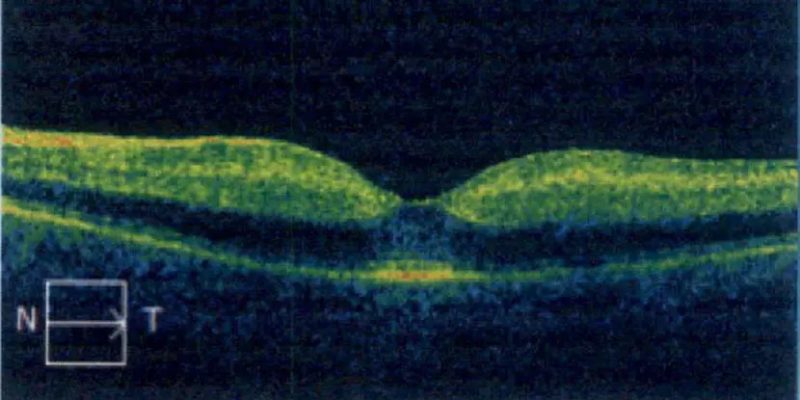Early Signs of Heart Disease Appear in the Eyes
By Reena Mukamal for the American Academy of Ophthalmology
Eye doctors may be able to detect signs of heart disease during a comprehensive eye exam, experts say. A new study finds that people with heart disease tend to have retinas marked by evidence of eye stroke.
Eye strokes happen when the eye is deprived of blood flow and oxygen, causing cells to die. This creates a mark, called a retinal ischemic perivascular lesion. These marks can be spotted when ophthalmologists use an imaging tool called optical coherence tomography, or OCT, to take a close look at the retina.
OCT scans of the retina (such as the one pictured above) are valuable ways to detect disease and dysfunction in all parts of the body — not just the eyes, says ophthalmologist and Academy spokesperson Joseph Nezgoda, MD, a retina specialist. Eye scans can detect signs of Alzheimer’s, Parkinson’s and other underlying health conditions.
How eye exams can detect heart disease
The eye is the only place in the body where a doctor can see the live
action of blood vessels, nerves and connecting tissue without relying
on an invasive procedure. That’s why eye doctors are often the first to detect health conditions including high blood pressure, high cholesterol, stroke and more.
While
the marks left behind by eye strokes may be present in low numbers in
healthy people, those with heart disease tend to have a far greater
number. Researchers arrived at these results by reviewing the medical
records of 84 people with heart disease and 76 healthy people, all of
whom had received a retinal OCT scan.
Catching heart disease early can save lives
The new study adds to the list of health conditions an eye exam may help detect.
“Your ophthalmologist may be able to take an image of your eye to help find cardiovascular disease earlier than before,” says Nezgoda.
For people with heart disease — the number one cause of death worldwide — early diagnosis and treatment could help stave off a heart attack or stroke.
In the future, ophthalmologists may refer patients to a cardiologist if they spot eye strokes on an OCT scan, especially if the patient hasn’t had a comprehensive health check or even a family history of heart disease.

